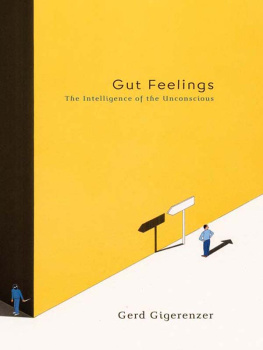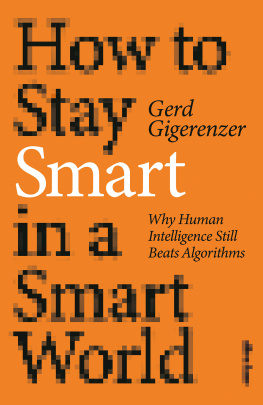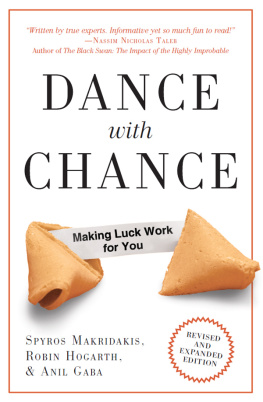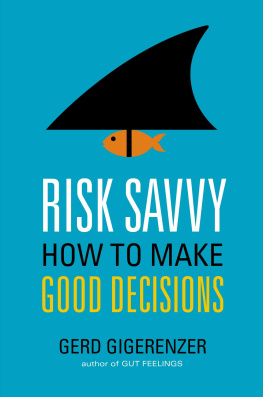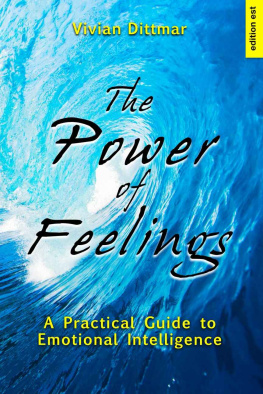Gerd Gigerenzer - Gut Feelings: The Intelligence of the Unconscious
Here you can read online Gerd Gigerenzer - Gut Feelings: The Intelligence of the Unconscious full text of the book (entire story) in english for free. Download pdf and epub, get meaning, cover and reviews about this ebook. year: 2008, publisher: Penguin Books, genre: Art. Description of the work, (preface) as well as reviews are available. Best literature library LitArk.com created for fans of good reading and offers a wide selection of genres:
Romance novel
Science fiction
Adventure
Detective
Science
History
Home and family
Prose
Art
Politics
Computer
Non-fiction
Religion
Business
Children
Humor
Choose a favorite category and find really read worthwhile books. Enjoy immersion in the world of imagination, feel the emotions of the characters or learn something new for yourself, make an fascinating discovery.
- Book:Gut Feelings: The Intelligence of the Unconscious
- Author:
- Publisher:Penguin Books
- Genre:
- Year:2008
- Rating:5 / 5
- Favourites:Add to favourites
- Your mark:
- 100
- 1
- 2
- 3
- 4
- 5
Gut Feelings: The Intelligence of the Unconscious: summary, description and annotation
We offer to read an annotation, description, summary or preface (depends on what the author of the book "Gut Feelings: The Intelligence of the Unconscious" wrote himself). If you haven't found the necessary information about the book — write in the comments, we will try to find it.
Gut Feelings: The Intelligence of the Unconscious — read online for free the complete book (whole text) full work
Below is the text of the book, divided by pages. System saving the place of the last page read, allows you to conveniently read the book "Gut Feelings: The Intelligence of the Unconscious" online for free, without having to search again every time where you left off. Put a bookmark, and you can go to the page where you finished reading at any time.
Font size:
Interval:
Bookmark:

THE INTELLIGENCE OF THE UNCONSCIOUS
VIKING
VIKING
Published by the Penguin Group
Penguin Group (USA) Inc., 375 Hudson Street, New York, New York 10014, U.S.A.
Penguin Group (Canada), 90 Eglinton Avenue East, Suite 700,
Toronto, Ontario, Canada M4P 2Y3 (a division of Pearson Penguin Canada Inc.)
Penguin Books Ltd, 80 Strand, London WC2R 0RL, England
Penguin Ireland, 25 St. Stephens Green, Dublin 2, Ireland (a division of Penguin Books Ltd)
Penguin Books Australia Ltd, 250 Camberwell Road, Camberwell,
Victoria 3124, Australia (a division of Pearson Australia Group Pty Ltd)
Penguin Books India Pvt Ltd, 11 Community Centre,
Panchsheel Park, New Delhi110 017, India
Penguin Group (NZ), 67 Apollo Drive, Mairangi Bay, Auckland 1311, New Zealand
(a division of Pearson New Zealand Ltd)
Penguin Books (South Africa) (Pty) Ltd, 24 Sturdee Avenue,
Rosebank, Johannesburg 2196, South Africa
Penguin Books Ltd, Registered Offices:
80 Strand, London WC2R 0RL, England
First published in 2007 by Viking Penguin,
a member of Penguin Group (USA) Inc.
Copyright Gerd Gigerenzer, 2007
All rights reserved
Illustrations by Jurgen Rossbach
LIBRARY OF CONGRESS CATALOGING IN PUBLICATION DATA
Gigerenzer, Gerd.
Gut feelings : the intelligence of the unconscious / Gerd Gigerenzer.
p. cm.
Includes bibliographical references and index.
ISBN: 978-1-1012-0241-8
1. Intuition. I. Title. BF315.5.G54 2007
153.4'4dc22 2006052810
Without limiting the rights under copyright reserved above, no part of this publication may be reproduced, stored in or introduced into a retrieval system, or transmitted, in any form or by any means (electronic, mechanical, photocopying, recording, or otherwise), without the prior written permission of both the copyright owner and the above publisher of this book.
The scanning, uploading, and distribution of this book via the Internet or via any other means without the permission of the publisher is illegal and punishable by law. Please purchase only authorized electronic editions and do not participate in or encourage electronic piracy of copyrightable materials. Your support of the authors rights is appreciated.
In affectionate memory of my mother and her courage,
humor, and patience
We know more than we can tell.
Michael Polanyi
The heart has its reasons of which reason knows nothing.
Blaise Pascal
W e think of intelligence as a deliberate, conscious activity guided by the laws of logic. Yet much of our mental life is unconscious, based on processes alien to logic: gut feelings, or intuitions. We have intuitions about sports, friends, which toothpaste to buy, and other dangerous things. We fall in love, and we sense that the Dow Jones will go up. This book asks: Where do these feelings come from? How do we know?
Can following your gut feelings lead to some of the best decisions? It seems naive, even ludicrous, to think so. For decades, books on rational decision making, as well as consulting firms, have preached look before you leap and analyze before you act. Pay attention. Be reflective, deliberate, and analytic. Survey all alternatives, list all pros and cons, and carefully weigh their utilities by their probabilities, preferably with the aid of a fancy statistical software package. Yet this scheme does not describe how actual peopleincluding the authors of these booksreason. A professor from Columbia University was struggling over whether to accept an offer from a rival university or to stay. His colleague took him aside and said, Just maximize your expected utilityyou always write about doing this. Exasperated, the professor responded, Come on, this is serious.
From economists to psychologists to John Q. Public, most people readily accept that the ideal of perfect beings with boundless knowledge and eternal time is unrealistic. Yet, they argue, without these bounds, and with more logic, we would make superior choices: we may not consider every angle, but we should. This message is not what you are going to read in the following pages.
With this book, I invite you on a journey into a largely unknown land of rationality, populated by people just like us, who are partially ignorant, whose time is limited and whose future is uncertain. This land is not one many scholars write about. They prefer to describe a land where the sun of enlightenment shines down in beams of logic and probability, whereas the land we are visiting is shrouded in a mist of dim uncertainty. In my story, what seem to be limitations of the mind can actually be its strengths. How the mind adapts and economizes by relying on the unconscious, on rules of thumb, and on evolved capacities is what Gut Feelings is about. The laws in the real world are puzzlingly different from those in the logical, idealized world. More information, even more thinking, is not always better, and less can be more. Ready for a glimpse?
THE HEARTS CHOICE
A close friend of mine (call him Harry) once found himself with two girlfriends, both of whom he loved, desired, and admired. Two, however, were one too many. Confused by contradicting emotions and unable to make up his mind, he recalled what Benjamin Franklin had once advised a nephew in a similar situation:
April 8, 1779
If you doubt, set down all the Reasons, pro and con, in opposite Columns on a Sheet of Paper, and when you have considered them two or three Days, perform an Operation similar to that in some questions of Algebra; observe what Reasons or Motives in each Column are equal in weight, one to one, one to two, two to three, or the like, and when you have struck out from both Sides all the Equalities, you will see in which column remains the Balance. [] This kind of Moral Algebra I have often practiced in important and dubious Concerns, and tho it cannot be mathematically exact, I have found it extreamly useful. By the way, if you do not learn it, I apprehend you will never be married.
I am ever your affectionate Uncle,
B. FRANKLIN1
Harry was greatly relieved that a logical formula existed to solve his conflict. So he took his time, wrote down all the important reasons he could think of, weighed them carefully, and went through the calculation. When he saw the result, something unexpected happened. An inner voice told him that it wasnt right. And for the first time, Harry realized that his heart had already decidedagainst the calculation and in favor of the other girl. The calculus helped to find the solution, but not because of its logic. It brought an unconscious decision to his awareness, based on reasons obscure to him.
Thankful for the sudden solution but puzzled by the process, Harry asked himself how it was possible to make unconscious choices in contradiction to ones deliberate reasoning. He was not the first to learn that reasoning can conflict with what we call intuition. Social psychologist Timothy Wilson and his colleagues once offered posters to two groups of women as a thank you present for participating in an experiment.2 In one group, each woman simply picked her favorite poster out of a selection of five; in a second group, each was asked to describe her reasons for liking or disliking each poster before choosing one. Interestingly, the two groups tended to take different posters home. Four weeks later, they were all asked how much they enjoyed their present. Those who had given reasons were less satisfied and regretted their choice more than those who had not given any. Here and in similar experiments, deliberate thinking about reasons seems to lead to decisions that make us less happy, just as consciously thinking about how to ride a bike or put on a spontaneous smile is not always better than its automatic version. The unconscious parts of our mind can decide without usthe conscious selfknowing its reasons, or, as in Harrys case, without being aware that a decision has been made in the first place.
Font size:
Interval:
Bookmark:
Similar books «Gut Feelings: The Intelligence of the Unconscious»
Look at similar books to Gut Feelings: The Intelligence of the Unconscious. We have selected literature similar in name and meaning in the hope of providing readers with more options to find new, interesting, not yet read works.
Discussion, reviews of the book Gut Feelings: The Intelligence of the Unconscious and just readers' own opinions. Leave your comments, write what you think about the work, its meaning or the main characters. Specify what exactly you liked and what you didn't like, and why you think so.

